In the Supporting Actress Smackdown series we take a particular Oscar vintage and explore it with a panel of artists and journalists. This episode goes way back to 1938.
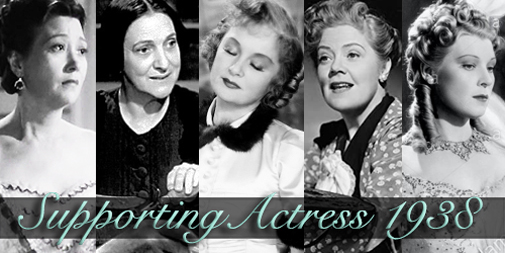

THE ACTRESSES & CHARACTERS
In 1938 the Academy was still evolving and the "Best Supporting Actress" category was just three years old. Still, their all time favourite type (the long-suffering wife/mom) was already showing its strength (Beulah Bondi in Of Human Hearts, noticeably that film's only nomination). Other then-popular character types like 'the vamp' (Milja Korjus in The Great Waltz) and ditzy/funny moms (Billie Burke in Merrily We Live! and Spring Byington in You Can't Take It With You) didn't stay in vogue with the Academy for as long. In 1938 we also got an historic first: Fay Bainter was the first actor to be double-nominated, competing in both Lead (White Banners) and Supporting (Jezebel) categories simultaneously, winning the latter. Will our panel agree?
THE PANELISTS
Here to talk about these performances and movies are the actors Steven Weber and Britney Young, Joanna Robinson from Vanity Fair, and TFE's busiest duo, Cláudio Alves and your host Nathaniel R. Let's begin.
1938
SUPPORTING ACTRESS SMACKDOWN + PODCAST
The companion podcast can be downloaded at the bottom of this article or by visiting the iTunes page...
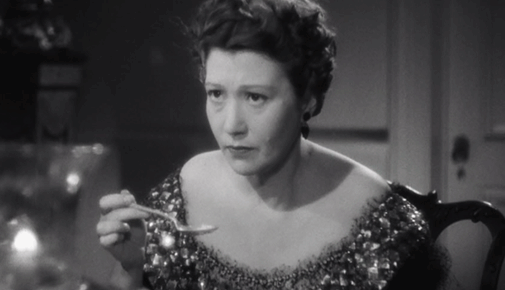
Fay Bainter as "Aunt Belle Massey" in Jezebel
Synopsis: A genteel southern woman can't control her willful niece. She watches helplessly as the young woman raises a ruckus (and then some).
Stats: Then 45 yrs old, 6th film, 6th billed. Double-nominated in lead and supporting this year (so first two of three eventual nominations). 28 minutes of screen time (or 27% of the running time)
Cláudio Alves: With a face made for playing tragedy, Fay Bainter walks away with Jezebel without ever stepping out of the shadow of Bette Davis' Oscar-winning star turn. Instead of stealing scenes and hogging the spotlight, the actress creates a fully-rounded human being out of little material and emerges as the movie's moral compass. When it's difficult to care about the unsympathetic protagonist, this actress is always there to punctuate a scene with the weary affection of a southern matriarch. She reminds us that we should be invested in the heroin's plight, for the sake of Bainter's Aunt Belle, if nothing else. Still, there are limits to her kind heart and, when Belle has had enough, her exhaustion, frustration, and withering judgment are haunting things to behold. To me, this is the platonic ideal of what a good supporting performance is supposed to be. ♥♥♥♥♥
Joanna Robinson: A classic Gone with the Wind knock-off released BEFORE Gone with the Wind I enjoy the hell out of Bette Davis’s performance, her costumes, and the gorgeous cinematography but it’s hard not to compare every other thing to GWTW. Bainter has one of the more unenviable roles in that her job is to mostly cluck at Julie and attempt to hold her back from her schemes but the scene where she has to warmly welcome and escort Pres’s new wife Amy upstairs all the while losing her mind wondering how Julie is going to react is a fantastic performance of conflicting emotions. ♥♥♥♥
Steven Weber: The marginalization of black people and black characters, and to a more immediate extent black actors in the 1930s, is now intolerable to watch. That said, the story still functions as a tale of redemption of a sort and the film itself is crisp and well-done on its face. Fay Bainter plays her role as Bette Davis’ mother with a theatrical precision that fits in with the style of the time. Her scenes between her and Davis are performed almost as if they are musical instruments, playing the notes perfectly and in harmony with the constant score, as if their parts were themselves composed and conducted by the director (Wyler). Bainter was effective and spare in her role as the reasonably sympathetic Southern antebellum matriarch. ♥♥♥♥
Britney Young: There are so many, MANY infuriating things about this movie; a lot of these issues hit close to current times, and I think unfortunately Fay Bainter’s performance gets lost amongst it all. Her performance barely made an impact on me, and I think she and every other actor got completely overshadowed by Bette Davis. Bainter plays Aunt Belle with a great warmness, but I was distracted by the cadence and delivery of her dialogue which felt out of place and would’ve been better suited for a biblical epic. I also felt her accent was all over the place and reminded me of a Disney fairy godmother rather than a southern belle. Now I don’t mean to say it was all bad. I was absolutely enthralled by how emotive her face was, easily able to convey her emotion even when she was silent. I think facial expressions are often a tool actors overlook, but Bainter used them to her advantage. ♥♥
Nathaniel R: I was surprised on this rewatch to realize that Bainter who I had remembered incorrectly as a huge part is so often backgrounded despite a lot of screentime. That said, she excels at the watchful qualities of the role. In some small way Aunt Belle is less a character than an ideal audience surrogate, continually unable to look away from Bette Davis' fiery Julie, riveted and appalled in equal measure. Until she's seen too much and breaks from audience proxy to internal film critic, if you will. The trip from her gobsmacked naive horror ("you can't fight marriage!" in closeup) to her condemnation of her kin in wide shot (the "Jezebel" scene) is like a beautifully judged withdrawal rather than a character arc. Fine playing from Bainter and gorgeously intuitive direction via William Wyler and his camera. ♥♥♥♥
Reader Write-Ins: "'I'm thinking of a woman called Jezebel, who did evil in the sight of God' You have no idea how many times I have wanted to use that line in real life on people. That delivery probably sealed the deal for her win that year. Bette Davis seems to recognize a worthy opponent but they never match again. Pity for us. " - Tom G. (Reader average: ♥♥♥½)
Actress earns 22½ ❤s
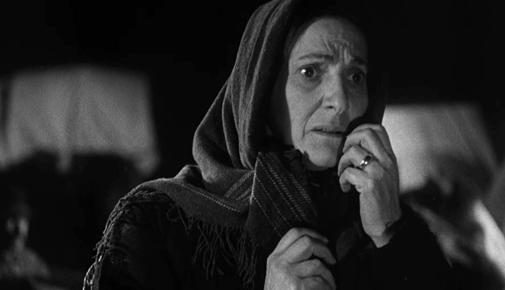
Beulah Bondi as "Miss Plimsoll" in Of Human Hearts
Synopsis: A preacher's wife struggles to the keep the peace between her strict husband and their ungrateful willful son.
Stats: Then 49 yrs old, 20th film, third billed. Second of two career nominations. 40 minutes of screentime (or 39% of the running time)
Cláudio Alves: Bondi was one of Old Hollywood's most reliable character actresses, one that I'm always pleased to watch, whether in big roles or bit parts. Her beatific portrait of motherhood in Of Human Hearts is certainly a big role, right on the edge of being a co-lead, though it presents the actress with little challenges and even fewer chances to show-off her craft. Still, Bondi does find space to add grace notes to the schmaltzy narrative, lacing her demure acquiescence with hints of disappointment and sorrow. Because of such glimpses into this devoted mother's inner life, her sacrifices gain more power than they would have had if they came from an unwavering, untroubled saint. ♥♥♥
Joanna Robinson: If Luise Rainer gets the gold medal for her martyred, selfless spouse, then surely Beulah gets the gold for this doormat performance as Jimmy Stewart’s long-suffering mother. I have to admit I had no idea about the Lincoln twist in this movie and it is WILD. I could also watch Stewart read the phone book. But every time we cut back to this lady and her woes I just found I couldn't connect. ♥
Steven Weber: BB is one of my favorite actors, most memorable for me as Mrs. Bailey in It’s a Wonderful Life (the second time she played James Stewart’s mother) and she clearly has range beyond the devoted spouse she plays here. She is always authentic and committed and Of Human Hearts is no exception, despite its being a treacly story, almost a parody! There’s a lot that is wince- inducing in the film but Beulah is earnest and convincing as a devoted mother to Stewart and wife to a stern preacher played by Water Huston. (I looked up her later performances and she won an Emmy for her last appearance in an episode of The Waltons, as a longtime resident of Walton’s Mountain who has to leave her home for the last time after the death of her husband.) Again, she demonstrates uncommon depth and mastery of her craft. One of the best. ♥♥♥♥♥
Britney Young: Goodness, does Bondi give a heartbreaking performance. Like the movie, her character builds; transitioning from a supportive and loving mother and wife, to a heartbroken widow abandoned by the son she loves dearly, who's well-being she continues to put above her own, even when she isn’t doing so well. Bondi’s Mary Wilkins is so sweet and kind and is clearly taken for granted by everyone, yet Bondi plays her with such strength. She is so convincing and I found myself getting upset at other characters for treating her so terribly. Especially during a scene late in the movie between her son and President Lincoln. Bondi doesn’t appear in the scene, but her performance is so strong that it impacts the emotionality of the scene and all I could think about was this woman sitting alone in her wooden house so stricken, not knowing the fate of her only son. And don’t get me started on the scene where she sells her horse! ♥♥♥♥
Nathaniel R: Solid and empathic -- I felt a real kaboom whenever she took a beat to acknowledge her own devastation and the truth about her husband or her son's limitations. She's got obvious craft and skill, but the confines of the roles unfortunately hem her in. Quietly effective but I'd argue not much more. ♥♥♥
Reader Write-Ins: "I was invested in her heart break as she tries her hardest to keep her family together. Great close up acting from Bondi -- it’s not shocking she made this lineup, I just wish it had been in lead." - Eoin D. (Reader average: ♥♥½)
Actress earns 18½ ❤s
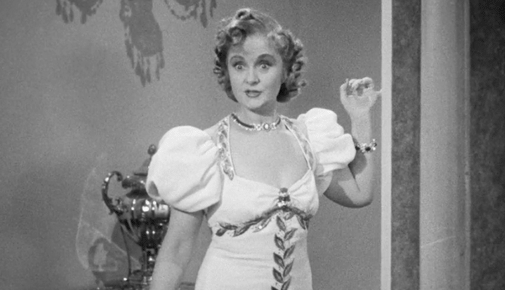
Billie Burke as "Mrs Kilbourne" in Merrily We Live
Synopsis: A ditzy society wife continuously hires hobos to work in her house hoping to "redeem" them. Her latest charity case is not what he appears to be and chaos erupts.
Stats: Then 54 yrs old, 40th film, 4th billed. First (and only) nomination. 24 minutes of screen time (or 26% of the running time).
Cláudio Alves: With an unforgettable patrician voice and flawless timing, Billie Burke could be a force to be reckoned with. In this My Man Godfrey-esque farce, she certainly leaves a strong impression as an airheaded society matron with a penchant for over-enthusiastic philanthropy. This is by no means a subtle performance, but there's a lot of fun to be found in Burke's broad approach. I especially love her way of inhabiting the space, often entering rooms without acknowledging, not even with her eyes, the people already in them. There's also a lot to admire about her paroxysms of childlike surprise and the slight suggestions of irony in her humor. Maybe the cheery flightiness of this woman is more deliberate than one might think. ♥♥♥♥
Joanna Robinson: One of two speeds for women in screwball comedies in this era was the child-like ditz. Burke isn’t the only one on this list but she might be the least interesting. It’s distracting, of course, to hear her Glinda the Good Witch voice shine through but that could be easily overcome if her character were a little more dynamic or had a moment of surprise depth, as is offered another example on this list. All in all a pretty messy My Man Godfrey knock-off. ♥♥
Steven Weber: First of all, an almost completely laugh-free “screwball comedy” featuring the rollicking adventures of a wealthy family whose matriarch’s hobby is to take in “tramps” and...make them...better? Directed by Norman Z. McLeod who directed some great comedies by The Marx Bros and WC Fields, this one has a crappy script and stereotypically portrayed rich people. Billie Burke is the matriarch, who is scatterbrained. I only know her from The Wizard of Oz, where she was fine and appealing; in this, she is annoying. She plays what she is given, however, so it’s not her fault. But her career consisted almost entirely of such roles and she was nominated for an Oscar for this role. I don’t know, maybe I was just tired. ♥♥♥
Britney Young: I LOVED Billie Burke’s performance! It’s very rare to see an actor play a dimwitted character so smartly, and Burke did a wonderful job. Her comedic timing was absolutely on point, and her quick one liners had me in stitches! I seriously laughed for a good few minutes after Rawlin’s told her some man came to the house acting like he lived there, and she responded “and did he?” For a movie that didn’t rely on much physical comedy, Burke’s Mrs. Kilborne elicited most of my laughs through the use of her body (that sounds weird). Her giant doe eyes enlarging to show her confusion and then acceptance of using a large wooden spoon to eat a melon, her full body mocking laugh during the dinner party scene, and her over the top dramatic crying and quick stepped run across the solarium after finding out Ambrose ran away with the silver, all were brilliant choices and made as much of a comedic impact as her dialogue. I had feared I wouldn’t be able to see her as anyone other than Glinda the Good Witch, but I was pleasantly surprised by her hilariously layered performance, and I would gladly watch this movie many times over. ♥♥♥♥♥
Nathaniel R: Delightful is too small an adjective, to be honest! There are so many things to treasure in her commited inventive performance. The best recurring detail Burke embellishes from the screenplay is Emily Kilbourne's vocal tics, always repeating things she's said herself or that she's just heard but sometimes not quite finishing them; Burke is playing her less as a dimwit and more as someone who is just not fully there, choosing to always be halfway inside her own rosier fantasies, and thus as endearing as she is maddening. Burke is consistently funny but the performance really soars in the middle of the picture during the big setpiece dinner sequence -- for an actress known best for her voice, her physical comedy is uproarious. ♥♥♥♥♥
Reader Write-Ins: "Young Oscar sure loved a ditzy matron, so it might be easy to write off what Burke is doing here. But she smartly combines the physical (the wide eyes when fascinated, pumping her voice full of helium) and the mental (accepting things at face value without a second thought, this woman cannot multitask to save her life!)." - James P. (Reader average: ♥♥♥)
Actress earns 22 ❤s
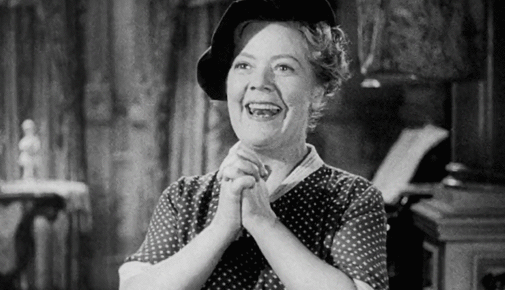
Spring Byington as "Penny Sycamore" in You Can't Take It With You
Synopsis: The mother of an unruly eccentric clan worries about losing her home as she tries out new personas like playwright and painter.
Stats: Then 52 yrs old, 37th film, billed. First (and only) nomination. 27 minutes of screentime (or 21% of the running time.)
Cláudio Alves: Capra's Best Picture champion is full of eccentric characters whose lunacy seems to sprout from a freeing lack of self-awareness. Byington's playwriting matriarch is at the eye of this storm, grounding the circus that is the Sycamore clan with smartly underplayed sentimentality and a sense of lived-in zaniness. Whether deploying cinema history's most adorable paperweight or acting as a proud hostess, Byington is always a delight. Still, hers is a role that demands little of its performer and I can't say any of the actress' choices surprised me. It's solid work that brings great warmth to the movie, but not something that demands Oscar glory. ♥♥
Joanna Robinson: Unlike Burke’s ditzy absentee mom in Merrily We Live, Spring Byington mother-of-the-soon-to-be-bride seems much more a character in her own right. She has her own arc separate from her daughter that’s tied to her house and home and her heartbreak over potentially losing it. The emotional break in her bubbly, prattling demeanor towards the end of the movie makes this one of the better performances on the list. ♥♥♥
Steven Weber: A fascinating woman, Spring had a long and varied career. This is an example of the actor being perfectly suited to the part. Reliable, hitting every note perfectly, she doesn’t strain herself trying to be real. The film itself is not as good as Capra’s later It’s A Wonderful Life though it has many similarities (including Jim the Raven, who appeared in all of Capra’ subsequent films). Byington is used sparingly in this film, unlike her competitors, who have larger roles and more screen time. Still, as stated, she is on the mark, pleasant and reliable. No false notes. ♥♥♥♥
Britney Young: If ever an angelic voice needed more screen time, it would be Spring Byington here. She plays Penny Sycamore with ease and charm, making you originally think she may be the sanest member of the Sycamore family, to only end the movie as lovingly goofy and naïve as the rest of them. Even when she is insulting Mrs. Kirby’s “silly” spiritualism hobby, I found Byington to be a delight and would’ve been absolutely thrilled if she was my potential mother-in-law. She plays her character’s eccentricities with such natural subtlety, she makes it seem completely normal to use a kitten as a paperweight or to lift up a policeman’s coat to see their gun (oooof, please don’t this!) My only complaint really, is that there simply wasn’t enough of her in this movie. And was my mind playing tricks on me, but did she spend the majority of the movie sitting down? ♥♥♥♥
Nathaniel R: Adorable and in sync with her movie... though would we miss it she wasn't? You Can't Take It With You gets comic mileage from its crowded chaos but due to just that feature the actors often get a little lost in the shuffle. I love her authenticity, like it's the most natural thing in the world to use your kitten as a paperweight, or to paint portraits while your daughter does pirouettes all around you. But I confess I don't understand why she was singled out. ♥♥
Reader Write-Ins: "She always added something in her appearances in films, whether they were good or bad. She's my pick." - Patrick G. (Reader average: ♥♥¼)
Actress earns 18¼ ❤s
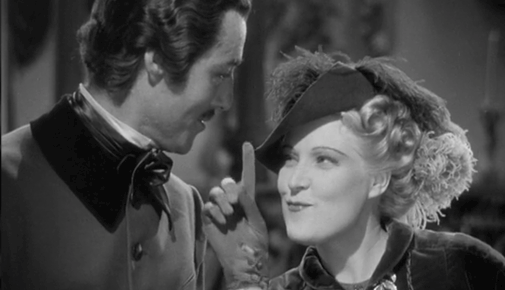
Miliza Korjus as "Carla Donner" in The Great Waltz
Synopsis: An opera diva and a rising young composer Johann Strauss make beautiful music together. The problem is he's already married.
Stats: Then 29 yrs old, debut film, third billed. 1st (and only) nomination. 40 minutes of screentime (or 39% of the running time.)
Cláudio Alves: By the time The Great Waltz was shot, Miliza Korjus was an acclaimed opera star, but she was also a silver screen novice. Unfortunately, that second bit is inescapable when seeing how she stumbles her way through a first movie role. With a wooden countenance, a tendency towards mugging for the camera, and an utter inability to play coquettish flirtation, Korjus is always wobbling on the precipice of unwatchability. For those who appreciate the preponderant style of lyrical singing of the 1930s, I suppose her musical moments may justify the actorly faults. Apologies for my meanness, but I've never been a fan of that particular style and thus found her renditions of Strauss's compositions to be strident nightmares. ♥
Joanna Robinson: First of all, I had no idea this Hammerstein/Strauss jukebox musical existed so thank you for bringing that into my life. Secondly, I have maybe never hated a character or characterization more than I hated Luise Rainer as Strauss’s suffering wife. But Miliza on the other hand….she’s not a trained actress, obviously, but she has an undeniable mischievous sparkle that I love. Her sly eyes and wolfy grin and her AMAZING voice really did it for me. ♥♥♥
Steven Weber: An incredibly annoying movie that is an admitted utter fabrication of Strauss’s story, but gorgeously photographed and directed. I feel like all the actors were in need for better material, however Miliza Korjus, who I’d never seen before, was impressive and appealingly nefarious and diva-ish, with an icy stillness even in her seduction of Strauss. She was a well known opera singer but she definitely held her won against the other actors in her debut, even posing an appealing contrast to Luise Rainer fascinatingly presentational performance of Strauss’s loyal, almost doormat wife. Korjus is interesting to me and probably should have gone on to do more films. Her performance is reminiscent of the silent screen “vamps” like Theda Bara and Pola Negri, whose stock characters lured men into moral traps using her sexuality. Woo woo. ♥♥♥♥
Britney Young: I have never wanted to tell someone to stop smiling as much as I did to Miliza Korjus in “The Great Waltz.” As much as I wanted to enjoy this performance, it just felt a bit “meh” to me. I feel like this happens frequently with musicals (we can consider this film a musical, right?) where a singer is cast in a role and sings phenomenally in the film, and then all of the sudden they are nominated for an Academy Award. I didn’t think Korjus’ acting was on the same level as her singing. She shouted a majority of her dialogue and her delivery was awfully cold. To her credit she did play Carla Donner with confidence and bravado, demanding your attention any time she walked into the room, in true diva form. But I didn’t feel she was soft or vulnerable enough and I didn’t believe her compassion in the scene when she let him go back to his wife in the end. (I also kept wondering if she was the model for Lina Lamont’s (Jean Hagen) character in the “The Dueling Cavalier,” the movie within Singin' in the Rain. Once I saw the resemblance, I couldn’t unsee it.) ♥♥
Nathaniel R: It's the Jennifer Hudson syndrome and it started wayyyy back in Oscar history. In that sometimes a singer will have unmistakable star charisma and tremendous pipes and those two things will be immediately mistaken for acting chops once they're projected onto the screen. Alas, those are different talents. Korjus' singing voice is definitely stunning, and it's weirdly thrilling and memorable to watch her weaponize it with the most aggressive flirting I've seen outside of the erotic thriller or romcom genres. She sells the predatory diva quality of a star who merely takes what she wants and finds it amusing that she can. But there's zero nuance and its one of the most repetitive performances I've ever seen; the lack of acting training shows. ♥♥
Reader Write-Ins: "This movie is a big fat load of malarkey, but it's energetic malarky, and Korjus is up to its spirit: she looks ready to devour everyone and everything in her path..." - Robert K. (Reader average: ♥♥¾)
Actress earns 14¾ ❤s
Fay Bainter won the Oscar and proves a formidable contender here as well. Though she tied with Billie Burke amongst our talking heads, the reader's vote proved the tie-breaker and Bainter ekes out a win by half a heart!
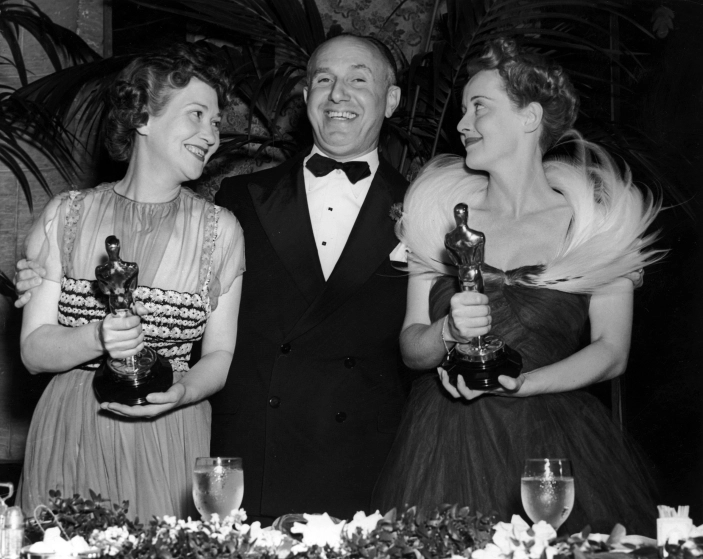 Faye Bainter and Bette Davis with their Jezebel hers & hers Oscars.
Faye Bainter and Bette Davis with their Jezebel hers & hers Oscars.
THE FULL PODCAST CONVERSATION
Download at the bottom of this post 👇 or on iTunes to hear the in-depth discussion.
NEXT UP: The 1965 Oscar race will be discussed on October 8th. Watch The Sound of Music, A Patch of Blue, Inside Daisy Clover and Othello and vote before then to maximize your enjoyment of the next Smackdown. [All Previous Smackdowns]